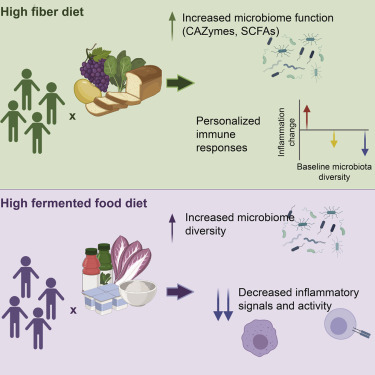"This is a surprising discovery," says Justin Sonnenburg, associate professor of microbiology and immunology at Stanford University School of Medicine. "Provides one of the first examples of how a simple change in diet can reproducibly reshape the microbiota"
Consuming foods such as yogurt, kefir, fermented cheeses and fermented vegetables generally improves the microbiotic diversity of the gut with important effects on other aspects of life as well. This is what emerges from a new study conducted by researchers from California.
It is yet another demonstration that a simple change in diet can significantly reshape the microbiome even in adults. A study conducted by Stanford School of Medicine involved 36 adult volunteers, divided into two groups, who changed their diet for ten weeks: the first diet included fermented foods, the second included foods with a high fiber content.
Researchers have focused their attention on high-fiber and fermented foods due to previous studies highlighting their health benefits: while fiber-laden foods have been associated with lower mortality levels, consumption of Fermented foods can help in maintaining a healthy weight and decrease the risk of diabetes, cancer and cardiovascular problems.

Credits: Cell
The researchers analyzed blood and stool samples collected before the start of the diet, during the 10-week diet, and in a 4-week post-diet period (in which study participants ate what they wanted). The results collected show the influence of the diet on intestinal microbes and on the immune system: on the one hand, in fact, those who increased the consumption of fermented foods showed an important change in the microbial diversity of the intestine; on the other hand, the group that followed a high-fibrous diet showed very small changes in the intestinal microbiome but a greater amount of carbohydrates in the stool samples (clear sign that the fibers do not degrade completely during the passage in the intestine).
In addition, 4 types of immune cells showed less activation in blood and stool samples belonging to the group that followed the fermented food diet: the levels of 19 inflammatory proteins measured in the blood samples were decreased. One of these proteins - interleukin 6 - is linked to conditions such as rheumatoid arthritis, type 2 diabetes and chronic stress. In contrast, none of these 19 inflammatory proteins decreased in participants who ate a high-fiber diet (and who therefore ate legumes, whole grains, seeds, fruits and vegetables); on average, the diversity of gut microbes also remained stable.
So diets high in fermented foods not only change the state of our gut but also the health of our immune system by offering a promising solution for reducing inflammation in adults. The data collected also suggests that increasing fiber intake over a short period of time is not enough to improve the health of our gut.
Fonte: Cell/ Science Daily
We also recommend:
- Fermented grains and legumes instead of meat: Researchers are studying new sustainable plant-based foods
- The vegan diet is better for losing weight and lowering cholesterol than the Mediterranean diet. I study
- Probiotics: 10 fermented foods that help the gut, metabolism and immune system


























